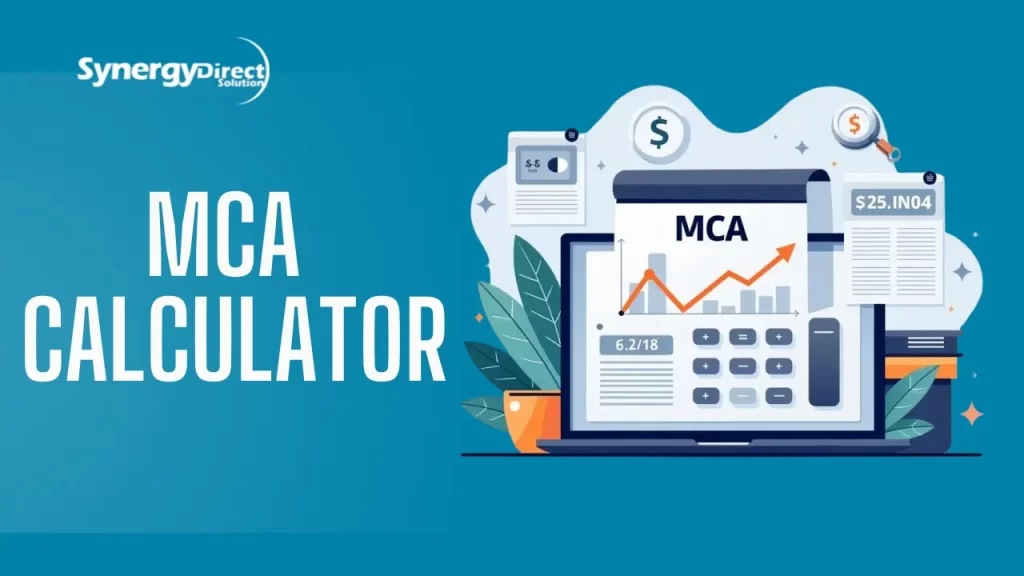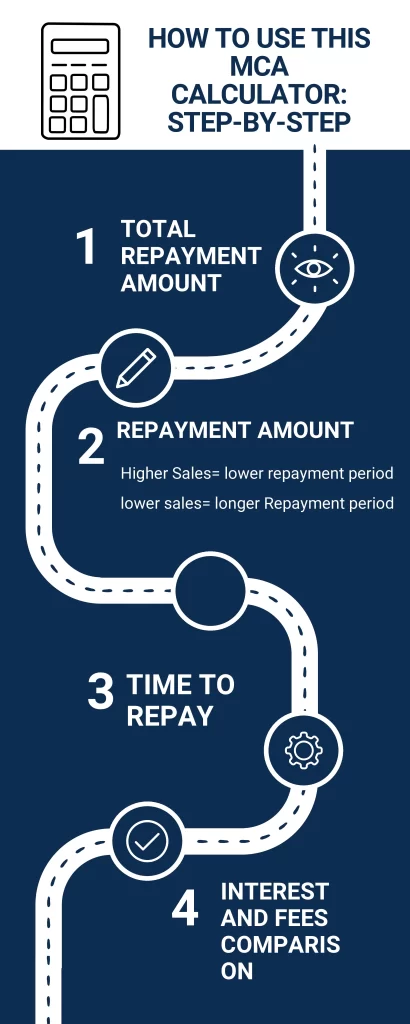( Merchant Cash Advance ) MCA Calculator | Loan | Fee | APR
A Merchant Cash Advance (MCA) is a financial product designed for businesses in need of quick capital. It’s a form of short-term funding where a business receives a lump sum of cash in exchange for a percentage of its future sales. As businesses evaluate MCA options, using an MCA Calculator can help them understand the potential costs and make an informed decision before proceeding. This tool is especially useful for small business owners who need to assess the feasibility and affordability of MCA financing.

In this guide, we will explain how to use the MCA Calculator, how to interpret the results, and what to be cautious about regarding potential hidden fees.
Merchant Cash Advance Calculator
Results:
Daily Repayment: $0.00
Total Repayment: $0.00
How to Use This MCA Calculator: Step-By-Step
Using an MCA Calculator is simple and straightforward. Here’s how you can calculate your Merchant Cash Advance costs:
Step 1: Input Your Loan Amount
The first step is to enter the total loan amount you are considering borrowing. This is the lump sum your business will receive in exchange for a percentage of future sales. The MCA Calculator will base the rest of the calculation on this amount.
For example:
Loan Amount: $10,000 (this is the amount of funding you plan to receive).
Step 2: Enter the Factor Rate
The factor rate is one of the key components of the MCA. It is a multiplier used to calculate the total repayment amount. Factor rates typically range between 1.1 and 1.5, depending on the lender and your business’s financial situation.
To find the total repayment amount:
Factor Rate: 1.3 (this means your business will need to pay 30% more than the loan amount).
Step 3: Input Your Daily/Weekly/Monthly Sales
Since an MCA is repaid based on a percentage of future sales, the MCA Calculator needs to know how much your business typically makes in sales. You’ll input your sales figures (usually on a daily, weekly, or monthly basis) depending on how frequently you plan to make payments.
For example:
Average Daily Sales: $500 (if you make $500 in sales per day, this will affect how quickly you can repay the loan).
Step 4: Select Your Repayment Frequency
MCA repayment schedules can vary. Some businesses repay their MCA daily, while others may have weekly or monthly repayment schedules. The MCA Calculator allows you to input your repayment frequency to help you determine the right payment structure.
For example:
Repayment Frequency: Daily (meaning the loan repayment is deducted from your daily sales revenue).
Step 5: Review the Results
After entering all the relevant details, the MCA Calculator will provide the total repayment amount (loan amount multiplied by the factor rate), your daily/weekly/monthly repayment amount based on your sales, and the estimated time it will take to fully repay the loan.
For example:
Total Repayment: $13,000 (if the loan amount is $10,000 and the factor rate is 1.3).
Daily Repayment Amount: $400 (depending on your daily sales and the agreed-upon percentage).
Estimated Repayment Time: 32.5 days (if $400 is deducted from your sales daily).
Step 6: Analyze the Results
Once the calculator provides the output, review the results to see how manageable the loan is for your business. Pay particular attention to how the repayment schedule fits with your sales projections.
How to Use This MCA Calculator: Step-By-Step
Understanding the output from the MCA Calculator is key to determining whether an MCA is a good fit for your business. Here are the key results you’ll get from the calculator and how to interpret them:
1. Total Repayment Amount
The total repayment amount is the sum of the loan amount and the factor rate. This is the total amount you’ll need to repay the lender. This value is important because it shows how much more you will pay in addition to the principal loan amount.
For example:
If you borrow $10,000 with a factor rate of 1.3, you’ll pay $13,000 in total ($10,000 loan + $3,000 in fees).
2. Repayment Amount
The repayment amount is the daily, weekly, or monthly amount that will be deducted from your sales. This value is based on the percentage of your sales that you agree to pay each day or week.
Higher Sales = Lower Repayment Period: If your sales are strong, the repayment period will be shorter since more money is deducted daily or weekly.
Lower Sales = Longer Repayment Period: If your sales are low, you’ll repay the loan more slowly, which can extend the repayment period.
3.Time to Repay
The time to repay is the estimated duration required to pay off the entire loan based on your average sales. If you’re borrowing a large amount with lower sales, it may take longer to repay, which means paying more in total fees over time.
4. Interest and Fees Comparison
Some MCA calculators also break down the costs by separating the principal (loan amount) and the fees (additional cost added via the factor rate). This allows you to see how much you’re paying in interest and fees for the loan.

Beware of Potential Hidden Fees
While an MCA can be a fast and convenient financing option for businesses, it’s important to be aware of hidden fees that might not be included in the calculator’s results. These fees can significantly increase the total cost of your loan.
1. Upfront Fees
Some MCA lenders charge upfront fees to process the loan application. These fees may include:
Origination fees: Typically charged as a percentage of the loan amount.
Application fees: Fees for processing your loan application.
Credit check fees: Some lenders charge a fee for checking your credit score.
These fees are not always included in the MCA Calculator results but can increase the overall cost of your loan.
2. Prepayment Penalties
If you choose to repay the MCA early, some lenders may charge a prepayment penalty. This fee is meant to compensate the lender for losing out on interest or fees that would have been paid over the full loan term.
Before committing to an MCA, make sure to check if there are prepayment penalties, as they can add a significant cost if you plan to pay off the loan early.
3. Compounding Fees
In some cases, MCA lenders may charge compounding fees if payments are delayed or missed. This can lead to your outstanding balance growing significantly if you’re unable to keep up with the repayments. Always ask the lender for the full terms and conditions before accepting the loan.
4. Processing Fees for Payments
Some lenders charge fees for every payment you make, particularly if you’re making daily or weekly payments. These fees may seem small at first but can add up over time, especially if you’re making frequent payments.
5. Late Payment Fees
If you miss a payment or fail to meet the required daily or weekly repayment, the lender may charge a late payment fee. This can increase the overall cost of the loan and add to the stress of meeting deadlines.
Conclusion
Using an MCA Calculator is a quick and effective way to assess the potential costs of a Merchant Cash Advance and decide if it fits your business needs. By following the steps outlined above, you can input your data into the calculator and see the total repayment amount, daily payments, and how long it will take to repay the loan.
However, always be mindful of the potential hidden fees that might not be included in the calculator’s results. Fees like origination costs, prepayment penalties, and processing fees can add significant costs to the loan. To avoid surprises, read all terms and conditions carefully and make sure you understand every aspect of the MCA agreement before proceeding.
